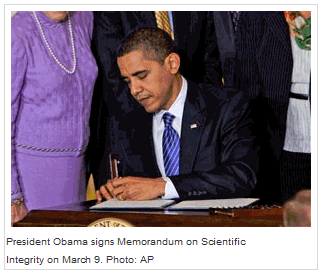|
News & Views item - September 2012 |
![]() Update on Scientific Integrity Policy in US Government Agencies. (September
17, 2012)
Update on Scientific Integrity Policy in US Government Agencies. (September
17, 2012)
On March 9, 2009 shortly after assuming office, US President Barack Obama issued
a memo directing the Office of Science and Technology Policy (OSTP) to develop a plan to restore scientific integrity to federal policymaking. The plan was due
by July 9, 2009. It read in part: "Political officials should not suppress or
alter scientific or technological findings and conclusions. If scientific and
technological information is developed and used by the Federal Government, it
should ordinarily be made available to the public. To the extent permitted by
law, there should be transparency in the preparation, identification, and use of
scientific and technological information in policymaking. The selection of
scientists and technology professionals for positions in the Executive Branch
should be based on their scientific and technological knowledge, credentials,
experience, and integrity."
plan to restore scientific integrity to federal policymaking. The plan was due
by July 9, 2009. It read in part: "Political officials should not suppress or
alter scientific or technological findings and conclusions. If scientific and
technological information is developed and used by the Federal Government, it
should ordinarily be made available to the public. To the extent permitted by
law, there should be transparency in the preparation, identification, and use of
scientific and technological information in policymaking. The selection of
scientists and technology professionals for positions in the Executive Branch
should be based on their scientific and technological knowledge, credentials,
experience, and integrity."
This directive was later amplified* by President Obama in a directive to John Holdren in his capacity as OSTP Director.
______________________________
The April 30, 2012 issue of Nature reported:
Scientific integrity The US defence department has joined President Barack Obama’s drive on scientific integrity, introducing a policy that bans its employees from asking scientists or engineers to alter or suppress their professional findings. Details of the policy, dated 26 July, were obtained under the US Freedom of Information Act by the watchdog group Public Employees for Environmental Responsibility (PEER) in Washington DC, and were released by PEER on 21 August. Twenty-two US government agencies have now released draft or final policies on scientific integrity. Four agencies have yet to release anything publicly, including the White House Office of Science and Technology Policy, which is responsible for leading the initiative.
Clearly, completion of the task given to Dr Holdren will not be finalised during President Obama's first term in office.
___________________________________________________
*Amplification of original memo.
(a) The selection and retention of candidates for science and technology positions in the Executive Branch should be based on the candidate's knowledge, credentials, experience, and integrity;
(b) Each agency should have appropriate rules and procedures to ensure the integrity of the scientific process within the agency;
(c) When scientific or technological information is considered in policy decisions, the information should be subject to well-established scientific processes, including peer review where appropriate, and each agency should appropriately and accurately reflect that information in complying with and applying relevant statutory standards;
(d) Except for information that is properly restricted from disclosure under procedures established in accordance with statute, regulation, Executive Order, or Presidential Memorandum, each agency should make available to the public the scientific or technological findings or conclusions considered or relied on in policy decisions;
(e) Each agency should have in place procedures to identify and address instances in which the scientific process or the integrity of scientific and technological information may be compromised; and
(f) Each agency should adopt such additional procedures, including any appropriate whistleblower protections, as are necessary to ensure the integrity of scientific and technological information and processes on which the agency relies in its decision-making or otherwise uses or prepares.